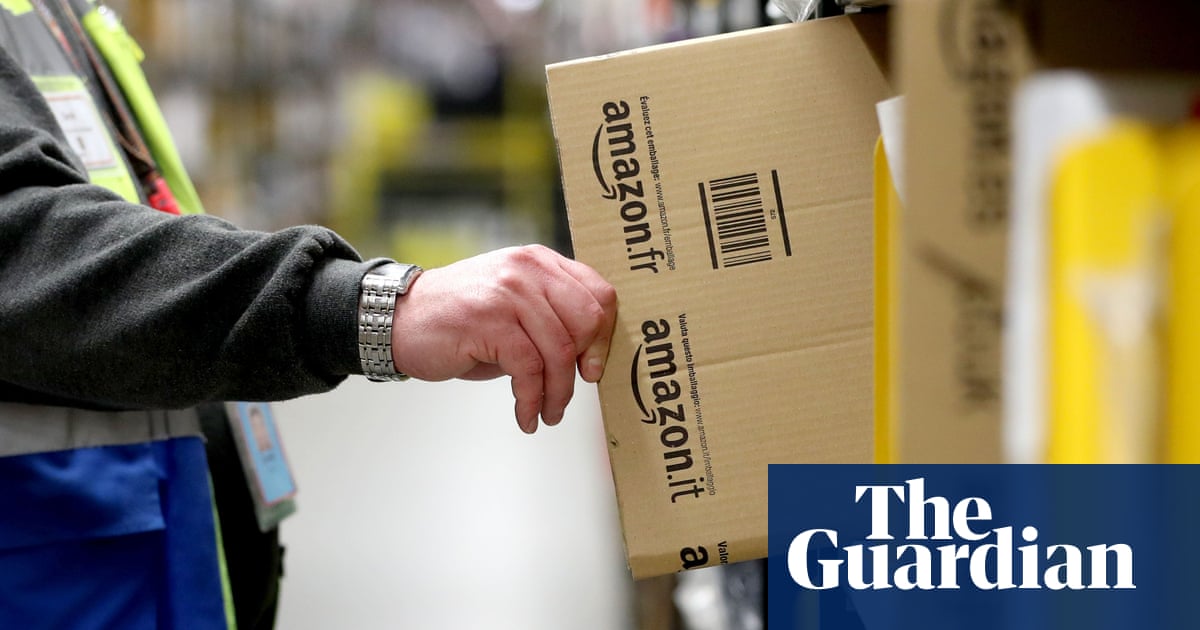Amazon UK pays corporation tax for first time since 2020

Amazon’s main UK division has paid corporation tax for the first time since 2020 after the end of a “super-deduction” tax break introduced by Rishi Sunak.
Amazon UK Services, which employs more than half of the group’s UK workers, said it paid £18.7m in “current tax” last year, which is understood to have been largely corporation tax.
The company received a £7.8m tax credit in 2022 and a £1.1m credit in 2021 after its investments in infrastructure, including robotic equipment at its warehouses, benefited from Sunak’s measure, introduced when he was chancellor. It said its other UK entities paid an undisclosed amount of current tax in 2022 and 2023.
Amazon, which has more than 25 warehouses in the UK and corporate offices in six cities, said its British businesses made sales of £27bn in 2023, up from £24bn in 2022. It now rings up more than double the sales of the traditional retailer Marks & Spencer in the UK, but pays less than double the tax.
The group has previously faced criticism over the amount of tax it pays in the UK relative to the size of its operations. High street retail chains have claimed the company has an unfair advantage as they pay high business rates on their physical stores.
Analysts said the corporation tax payment was likely to have been prompted by lower capital spending by Amazon, as it has reined in warehouse expansion. Fewer government tax breaks and lower historic losses to offset against its tax bill had also reduced the bill, they said.
The “super-deduction” scheme allowed companies to offset 130% of investment spending on plant and machinery against profits for two years from April 2021.
It was superseded by the government’s full-year expensing scheme, under which companies can claim 100% tax relief on qualifying plant and machinery investment, which led to lower tax relief for Amazon UK Services.
Total tax on profit paid by Amazon UK Services was £81.3m in 2023, up from £66.4m a year before, as sales rose almost 5% to £6.9bn and pre-tax profits increased 13% to £250.7m.
In total, Amazon’s full UK operation paid £932m in tax last year – including business rates, corporation tax and national insurance contributions – up from £781m the year before.
Amazon said it was now one of the top 10 business rates contributors in the UK and it invested £12bn in the UK last year, including more than £1.5bn in infrastructure, down from £1.6bn a year before.
Paul Monaghan, the chief executive of the Fair Tax Foundation, said Amazon needed to be more transparent about its entire UK tax affairs. He said the public “want to know how much corporation tax they pay in the UK. They want to know how much profit they actually account for in the UK from the £27bn of revenue they collect here. One can only surmise that the lack of transparency is connected to the sizeable chunk of UK revenue that is still shunted to the historically ‘loss-making’ subsidiary in Luxembourg.”
after newsletter promotion
Amazon declined to comment on the criticisms.
The group’s Amazon Web Services (AWS) arm, which provides cloud computing and other services to thousands of businesses, recently announced plans to invest £8bn over the next five years in building, operating and maintaining datacentres in the UK.
In an indication of Amazon’s increasing use of technology in its warehouses, employee numbers remained steady at 75,000 after adding 10,000 new roles a year in 2021 and 2020.
The company, founded by the now-billionaire Jeff Bezos in 1994, enacted a hiring freeze in the first part of last year as part of an efficiency drive that led to the closure of three of its older UK warehouses, affecting 1,200 jobs. The firm has faced a fight with the GMB over union recognition at its huge warehouse in Coventry this year.
Related
Why investing in women is a vital next step for…
Get Nadine White's Race Report newsletter for a fresh perspective on the week's newsGet our free newsletter from The Independent's Race CorrespondentGet our fre
Business secretary signals major shift on electric car policy to…
In a determined effort to retain Nissan’s manufacturing presence in Britain, Business Secretary Jonathan Reynolds has vowed to implement “substantial c
Joint Statement: Business Secretary and Fujitsu Services Ltd
Business and Trade Secretary Jonathan Reynolds today (Friday 7 March) met chiefs for Fujitsu in Tokyo to begin talks over the cost of redress for victims of th
UK foreign secretary backs multilateral defence funding for Europe
UK foreign secretary David Lammy has said that a new multilateral fund will be needed to secure Europe’s defence as he confirmed that Britain is “open to”













